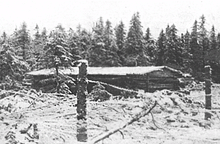The New Yorker о Соловках
"Соловки теперь у газетчиков в моде. Только ничего хорошего от такой моды Соловкам не будет. Чуть не в каждом журнале, в десятках газет появляются фотоэтюды и короткие репортажи о Соловках... "
( Юрий Казаков. "Литературная газета", 13.09.1966 )
Bolsheviks established a camp
Bolsheviks established a camp
"In time, Likhachev was transported to the Solovetsky Islands—or Solovki—a string of small islands in the White Sea near the Arctic Circle, where medieval Orthodox monks built monasteries, tsars of the sixteenth century built prisons, and, in 1923, the Bolsheviks established a camp. When I was getting to know him, Dmitri Sergeyevich spoke hardly at all of his sentence at Solovki. Glasnost allowed it; his modesty did not. But in 1999, shortly before he died, at ninety-two, Likhachev handed me a gift, a copy of his memoirs. In the book, Likhachev sketches the complicated topography of Solovki, the conditions there, the scholars and criminals he befriended, the varieties of cruelty he witnessed and experienced. Solovki was where the structures and basic tenets of the labor-camp system began to take shape. It was at Solovki, for example, that a system was put in place of feeding prisoners according to their work output (thereby insuring that the weak died of hunger and exposure, while the strong helped to build the industrial infrastructure of the state). It was at Solovki that guards devised such tortures as crippling a man by forcing him to sit on a pole for eighteen hours straight or killing him by throwing him down a long outdoor stairway. It was where guards exposed prisoners for days to the clouds of mosquitoes that swarmed around the island in summer. Another prisoner recalls, in a memoir, how this torture was modified at a Siberian camp:
The mosquitoes crawled up our sleeves, under our trousers. One’s face would blow up from the bites. At the work site, we were brought lunch, and it happened that as you were eating your soup, the mosquitoes would fill up the bowl like buckwheat porridge. They filled up your eyes, your nose and throat, and the taste of them was sweet, like blood.
 The prisoners at Solovki were isolated from the world. No one, save the guards and a few monks, witnessed their suffering; they were sure that they would die there and be buried in unmarked graves. And yet, a year after Likhachev arrived at Solovki, he and his fellow-prisoners learned that Maxim Gorky, perhaps the most popular Soviet writer of the time, was coming to visit. Here, at last, was their witness and savior. Gorky was a hero to Russians, not merely for his prose but also for his proletarian authenticity, his adventures as an urchin and a juvenile delinquent, described in “Childhood” and “The Lower Depths.” Now Gorky’s ship, the Gleb Boky, named for the camp chief, was about to dock at Solovki. “All we prisoners were delighted,” Likhachev wrote. “‘That Gorky will spot everything, find out everything. He’s been around, you can’t fool him. About the logging and the torture on the tree-stumps, the hunger, the disease, the three-tier bunks, those without clothes, the sentences without conviction.’”
The prisoners at Solovki were isolated from the world. No one, save the guards and a few monks, witnessed their suffering; they were sure that they would die there and be buried in unmarked graves. And yet, a year after Likhachev arrived at Solovki, he and his fellow-prisoners learned that Maxim Gorky, perhaps the most popular Soviet writer of the time, was coming to visit. Here, at last, was their witness and savior. Gorky was a hero to Russians, not merely for his prose but also for his proletarian authenticity, his adventures as an urchin and a juvenile delinquent, described in “Childhood” and “The Lower Depths.” Now Gorky’s ship, the Gleb Boky, named for the camp chief, was about to dock at Solovki. “All we prisoners were delighted,” Likhachev wrote. “‘That Gorky will spot everything, find out everything. He’s been around, you can’t fool him. About the logging and the torture on the tree-stumps, the hunger, the disease, the three-tier bunks, those without clothes, the sentences without conviction.’”
For the occasion, the Solovki administration had spruced up the camp, painted walls, planted trees, allowed husbands and wives to be together (as they never were ordinarily). And, as it turned out, Gorky failed to see beyond the facade that had been erected for him. He seemed disinclined to try. He visited the punishment cells and, after a few short minutes, pronounced them “excellent.” He spent hardly any time at all with prisoners, though he did speak for forty minutes with a young boy and declared himself fascinated and pleased. (After Gorky left the camp, Likhachev writes, that boy was never seen again.) The writer stayed for three days and spent nearly all of it with the secret-police officers who ran the complex.
The Soviet leadership could hardly complain about the essay that Gorky eventually wrote about his experience: “There is no impression of life being over-regulated. No, there is no resemblance to a prison; instead it seems as if these rooms are inhabited by passengers rescued from a drowned ship.” The political prisoners at Solovki—men like Likhachev—were, according to Gorky, merely “counter-revolutionaries, emotional types, monarchists.” It is hard to know to what degree the censors shaped Gorky’s thoughts, but the text certainly suggests a man well satisfied with Soviet conditions and Soviet kindness. “If any so-called cultured European society dared to conduct an experiment such as this colony,” he wrote, “and if this experiment yielded fruits as ours had, that country would blow all its trumpets and boast about its accomplishments.”
After Gorky left Solovki, the guards began a round of mass executions. “The graves had been dug a day before the shootings,” Likhachev recalled. “The executioners were drunk. One bullet per victim. Many were buried alive, just a thin layer of earth over them. In the morning, the earth on the pit was still moving. . . . The camp had been cleared of ‘superfluous’ persons.”
The administration at Solovki put up a sign at the main camp, which captured perfectly the Leninist program. It read, “With an Iron Fist, We Will Lead Humanity to Happiness.” (David Remnick. Seasons in hell. How the Gulag grew. The New Yorker. 2003-04-07)
Поделиться в социальных сетях
